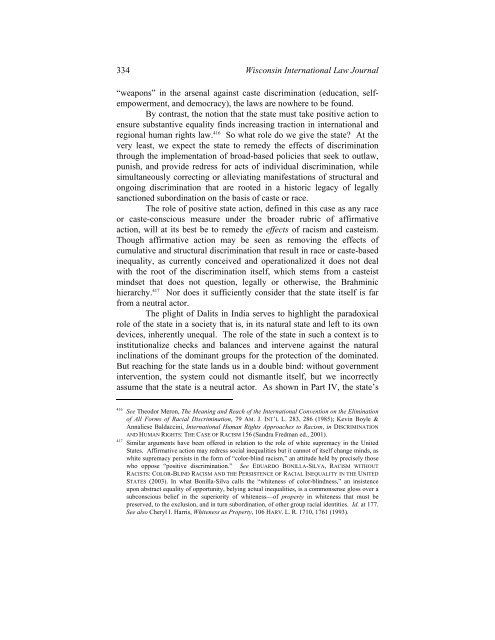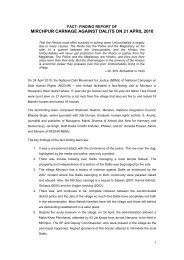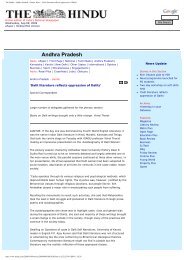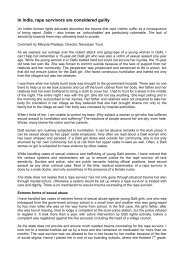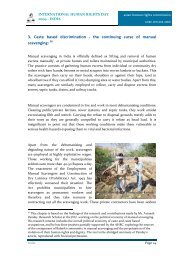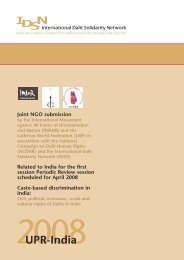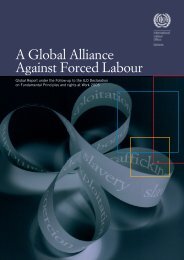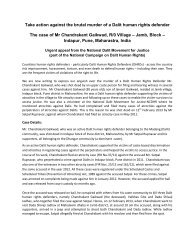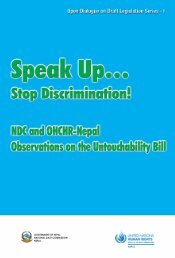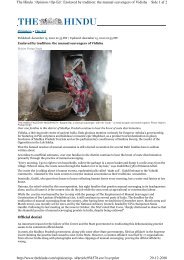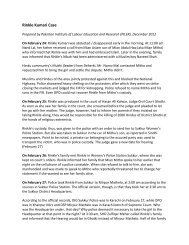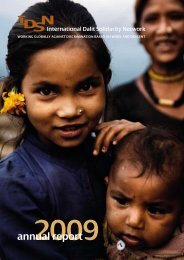334 Wisconsin <strong>International</strong> Law Journal“weapons” in the arsenal against <strong>caste</strong> discrimination (education, selfempowerment,and democracy), the <strong>law</strong>s are nowhere to be found.By contrast, the notion that the state must take positive action toensure substantive <strong>equal</strong>ity finds increasing traction in international andregional human rights <strong>law</strong>. 416 So what role do we give the state? At thevery least, we expect the state to remedy the effects of discriminationthrough the implementation of broad-based policies that seek to out<strong>law</strong>,punish, and provide redress for acts of individual discrimination, whilesimultaneously correcting or alleviating manifestations of structural andongoing discrimination that are rooted in a historic legacy of legallysanctioned subordination on the basis of <strong>caste</strong> or race.The role of positive state action, defined in this case as any raceor <strong>caste</strong>-conscious measure under the broader rubric of affirmativeaction, will at its best be to remedy the effects of racism and <strong>caste</strong>ism.Though affirmative action may be seen as removing the effects ofcumulative and structural discrimination that result in race or <strong>caste</strong>-basedin<strong>equal</strong>ity, as currently conceived and operationalized it does not dealwith the root of the discrimination itself, which stems from a <strong>caste</strong>istmindset that does not question, legally or otherwise, the Brahminichierarchy. 417 Nor does it sufficiently consider that the state itself is farfrom a neutral actor.The plight of <strong>Dalit</strong>s in India serves to highlight the paradoxicalrole of the state in a society that is, in its natural state and left to its owndevices, inherently un<strong>equal</strong>. The role of the state in such a context is toinstitutionalize checks and balances and intervene against the naturalinclinations of the dominant groups for the protection of the dominated.But reaching for the state lands us in a double bind: without governmentintervention, the system could not dismantle itself, but we incorrectlyassume that the state is a neutral actor. As shown in Part IV, the state’s416 See Theodor Meron, The Meaning and Reach of the <strong>International</strong> Convention on the Eliminationof All Forms of Racial Discrimination, 79 AM. J. INT’L L. 283, 286 (1985); Kevin Boyle &Annaliese Baldaccini, <strong>International</strong> Human Rights Approaches to Racism, in DISCRIMINATIONAND HUMAN RIGHTS: THE CASE OF RACISM 156 (Sandra Fredman ed., 2001).417 Similar arguments have been offered in relation to the role of white supremacy in the UnitedStates. Affirmative action may redress social in<strong>equal</strong>ities but it cannot of itself change minds, aswhite supremacy persists in the form of “color-blind racism,” an attitude held <strong>by</strong> precisely thosewho oppose “positive discrimination.” See EDUARDO BONILLA-SILVA, RACISM WITHOUTRACISTS: COLOR-BLIND RACISM AND THE PERSISTENCE OF RACIAL INEQUALITY IN THE UNITEDSTATES (2003). In what Bonilla-Silva calls the “whiteness of color-blindness,” an insistenceupon abstract <strong>equal</strong>ity of opportunity, belying actual in<strong>equal</strong>ities, is a commonsense gloss over asubconscious belief in the superiority of whiteness—of property in whiteness that must bepreserved, to the exclusion, and in turn subordination, of other group racial identities. Id. at 177.See also Cheryl I. Harris, Whiteness as Property, 106 HARV. L. R. 1710, 1761 (1993).
Vol. 26, No. 2 Equal <strong>by</strong> Law, Un<strong>equal</strong> <strong>by</strong> Caste 335<strong>law</strong> enforcement and administrative machinery is itself constructed alongthe hierarchy of <strong>caste</strong>.Even if we were to assume that the state was both neutral andfaithful in its implementation of the <strong>law</strong>, we still must ask whether the<strong>law</strong> can be a vehicle for social change, or does it simply divert attentionaway from the social condition it masks and act as a safety-valve todiffuse pressure for real reform. Moreover, can the <strong>law</strong> take away thatwhich it did not create? If <strong>equal</strong>ity is understood as a value as opposedto a <strong>law</strong>, then can the state as a non-emotional body ever address it? 418Any program of affirmative action, no matter how broadly defined,implemented, and enforced, will not work to remove the underlyingprejudice as long as it conceives of “the oppressed” as its sole target.2. WHAT ABOUT THE “TOUCHABLES?”If the human rights framework is to be critiqued for presumingthat the state will ensure that the <strong>law</strong>s will trickle down, then it must alsobe scrutinized for setting its sites on those at the “bottom.” Thedownward trajectory of human rights sets its sights on the wrong targetand invariably assumes that the persona to be reclaimed is that of the“untouchable victim.” As noted <strong>by</strong> Ambedkar,It is usual to hear all those who feel moved <strong>by</strong> the deplorablecondition of the Untouchables unburden themselves <strong>by</strong> uttering thecry, “We must do something for the Untouchables.” One seldomhears any of the persons interested in the problem saying, “Let us dosomething to change the Touchable Hindu.” 419Affirmative action policies, as currently envisioned andadvanced, fail to sufficiently transform the racist or <strong>caste</strong>ist hierarchyitself. And what of the fact that the very existence of these policies helpto strengthen and cement the very identities that we seek to fight against?418 On this point, noted <strong>Dalit</strong> journalist, Chandra Ban Prasad, poignantly asks:How can the State deal with issues of occupational and blood purity? Can the State,for instance, legislate and execute the idea that a certain percentage of Brahmans musttake to cleaning toilets and sweeping floors? Can it ensure that a certain percentageof Kshatriyas must marry <strong>Dalit</strong>s? . . . . Why should we blame a bull for not givingmilk even after we fed it with that expectation?Chandra Ban Prasad, Markets and Manu: Economic Reforms and its Impact on Caste in India 15-16 (CASI Working Paper Series, 08-01, 2008), available at http://casi.ssc.upenn.edu/research/papers/Chandrabhan_2008.pdf.419 See S. Anand, On Claiming <strong>Dalit</strong> Subjectivity, http://www.india-seminar.com/2006/558/558%20s.%20anand.htm (relying on quote <strong>by</strong> B.R. Ambedkar) (last visited Aug. 16, 2008).
- Page 1 and 2:
EQUAL BY LAW, UNEQUAL BY CASTE: THE
- Page 3 and 4:
Vol. 26, No. 2 Equal by Law, Unequa
- Page 5 and 6:
Vol. 26, No. 2 Equal by Law, Unequa
- Page 7 and 8:
Vol. 26, No. 2 Equal by Law, Unequa
- Page 9 and 10:
Vol. 26, No. 2 Equal by Law, Unequa
- Page 11 and 12:
Vol. 26, No. 2 Equal by Law, Unequa
- Page 13 and 14:
Vol. 26, No. 2 Equal by Law, Unequa
- Page 15 and 16:
Vol. 26, No. 2 Equal by Law, Unequa
- Page 17 and 18:
Vol. 26, No. 2 Equal by Law, Unequa
- Page 19 and 20:
Vol. 26, No. 2 Equal by Law, Unequa
- Page 21 and 22:
Vol. 26, No. 2 Equal by Law, Unequa
- Page 23 and 24:
Vol. 26, No. 2 Equal by Law, Unequa
- Page 25 and 26:
Vol. 26, No. 2 Equal by Law, Unequa
- Page 27 and 28:
Vol. 26, No. 2 Equal by Law, Unequa
- Page 29 and 30: Vol. 26, No. 2 Equal by Law, Unequa
- Page 31 and 32: Vol. 26, No. 2 Equal by Law, Unequa
- Page 33 and 34: Vol. 26, No. 2 Equal by Law, Unequa
- Page 35 and 36: Vol. 26, No. 2 Equal by Law, Unequa
- Page 37 and 38: Vol. 26, No. 2 Equal by Law, Unequa
- Page 39 and 40: Vol. 26, No. 2 Equal by Law, Unequa
- Page 41 and 42: Vol. 26, No. 2 Equal by Law, Unequa
- Page 43 and 44: Vol. 26, No. 2 Equal by Law, Unequa
- Page 45 and 46: Vol. 26, No. 2 Equal by Law, Unequa
- Page 47 and 48: Vol. 26, No. 2 Equal by Law, Unequa
- Page 49 and 50: Vol. 26, No. 2 Equal by Law, Unequa
- Page 51 and 52: Vol. 26, No. 2 Equal by Law, Unequa
- Page 53 and 54: Vol. 26, No. 2 Equal by Law, Unequa
- Page 55: Vol. 26, No. 2 Equal by Law, Unequa
- Page 58 and 59: 312 Wisconsin International Law Jou
- Page 60 and 61: 314 Wisconsin International Law Jou
- Page 62 and 63: 316 Wisconsin International Law Jou
- Page 64 and 65: 318 Wisconsin International Law Jou
- Page 66 and 67: 320 Wisconsin International Law Jou
- Page 68 and 69: 322 Wisconsin International Law Jou
- Page 70 and 71: 324 Wisconsin International Law Jou
- Page 72 and 73: 326 Wisconsin International Law Jou
- Page 74 and 75: 328 Wisconsin International Law Jou
- Page 76 and 77: 330 Wisconsin International Law Jou
- Page 78 and 79: 332 Wisconsin International Law Jou
- Page 82 and 83: 336 Wisconsin International Law Jou
- Page 84 and 85: 338 Wisconsin International Law Jou
- Page 86 and 87: 340 Wisconsin International Law Jou
- Page 88 and 89: 342 Wisconsin International Law Jou


